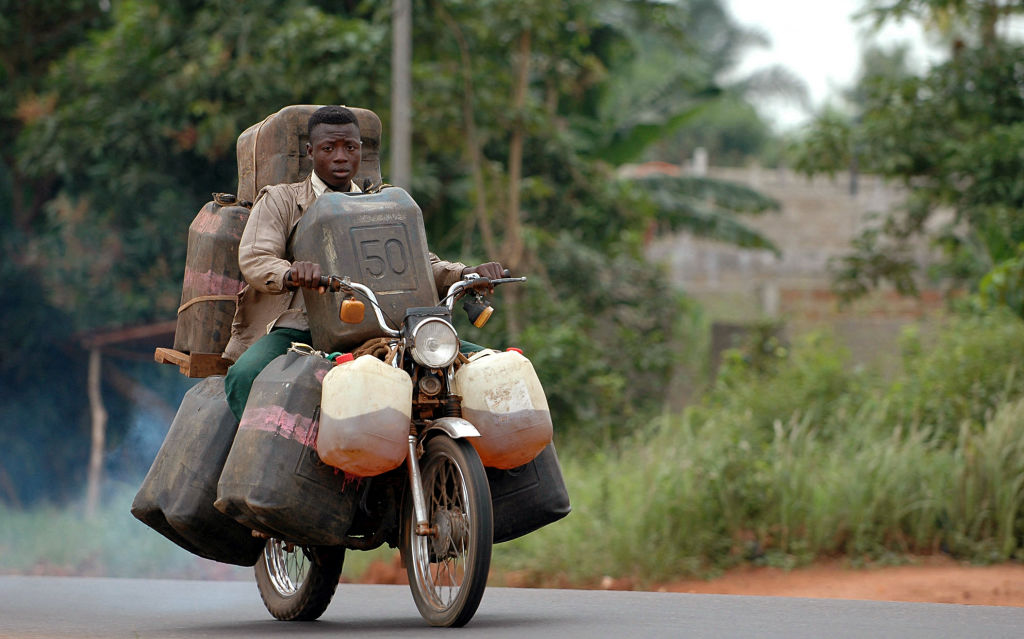In Benin, Smuggling Supports Extremism
ADF STAFF
On the border of Benin and Burkina Faso, the disputed Kourou-Koualou area hosts a wide-ranging market of illicit activities that fuel insecurity and help extremism spread south from the Sahel.
Like its neighbors along the Gulf of Guinea, Benin is threatened by the extremism that has made the countries along its northern border — Burkina Faso, Mali and Niger — the global epicenter for terrorism.
So far, Benin has largely fended off those threats, but experts say the government must do more to counter the illicit activities, such as fuel trafficking, that could undermine that success.
“We see recruitment and radicalization on the rise, which may be an adverse trend for the future,” Masood Karimipour, chief of the Terrorism Prevention Branch at the United Nations Office on Drugs and Crime, said recently, commenting on the release of the 2023 Global Terrorism Index (GTI).
The GTI is compiled by the Institute for Economics and Peace (IEP), which produces the yearly index based on data from 163 countries.
Benin reported 15 more terrorism-related deaths in 2022 than it did in 2021.
Underlying Benin’s creeping extremism are the smugglers, traffickers and intermediaries driving an illicit economy trading in fuel, weapons, gold, poached animals, and even agricultural supplies in the Atacora and Alibori departments on the northern frontier.
Koualou sits in the northwest corner of Atacora next to Pendjari National Park, the site of Benin’s first terrorist attack, which saw two French tourists kidnapped and their local guide killed in 2019. Extremists use Pendjari as a refuge, along with Arly National Park in Burkina Faso and W National Park in Niger.
Fuel smuggling, which has been a mainstay of the illicit economy in northern Benin for many years, shows the way extremists benefit from Benin’s black markets.
Traffickers, who can include extremists, smuggle fuel into Benin from Nigeria or out of Benin into Burkina Faso and Togo. Until recently, that fuel sometimes came from tanker trucks that illegally offloaded their cargo on the Benin side of Kourou-Koualou while traveling from Benin’s port in Cotonou to Burkina Faso or Mali.
Well-developed and well-organized smuggling networks employ many young Beninese who work as haulers, wholesalers and retailers, according to an analysis by South Africa’s Institute for Security Studies (ISS). Fuel smuggled from Benin supports extremists as far away as Gao, Mali, according to reports.
“The presence of violent extremist groups in Kourou-Koualou encouraged fuel smuggling, thanks to the alliance of interests established between these groups and fuel traffickers,” ISS analysts wrote in a recent report on Benin’s black markets. “Main factors include the shortage (or absence) of service stations, the ease with which smuggled fuel can be obtained along the main roads, its affordability, and the complicity of civil servants and government employees (particularly among the security forces).”
A crackdown on both sides of the border in 2021 put a lid on fuel smuggling in Kourou-Koualou. In response, some extremists simply circumvented security forces while others started hijacking tankers in Burkina Faso so they could sell the stolen fuel in Benin.
Experts say fuel smuggling and similar illicit businesses help extremists curry favor with Beninese residents. It exploits residents’ feeling that government service providers ignore them in favor of regions closer to the center of political power.
A lack of government services can play an important role in driving extremism, according to Karimipour.
The situation in Kourou-Koualou is complicated by the fact that both Benin and Burkina Faso claim the territory near the tripoint with Togo and jointly administer it. To reduce the chance of conflict, both countries have withdrawn their militaries. The lack of security has encouraged smuggling and related activities.
However, that decision can play into extremists’ hands by feeding local resentment, according to Karimipour.
Beninese authorities have taken steps to undercut fuel smuggling — including dropping the tax on construction materials needed to build fuel stations.
This year, Benin began stepping up its military presence on its side of the Kourou-Koualou territory in an effort to clamp down on extremism and illicit activities. However, it’s not clear how long the government will maintain that presence, according to ISS.
Benin’s success likely depends on the ability of Burkina Faso’s ruling junta to control its provinces bordering Benin, according to ISS analysts.
“Without an effective state presence in the area, Kourou-Koualou could continue to serve as a supply and retreat base for extremist groups,” the ISS analysts wrote.


Comments are closed.